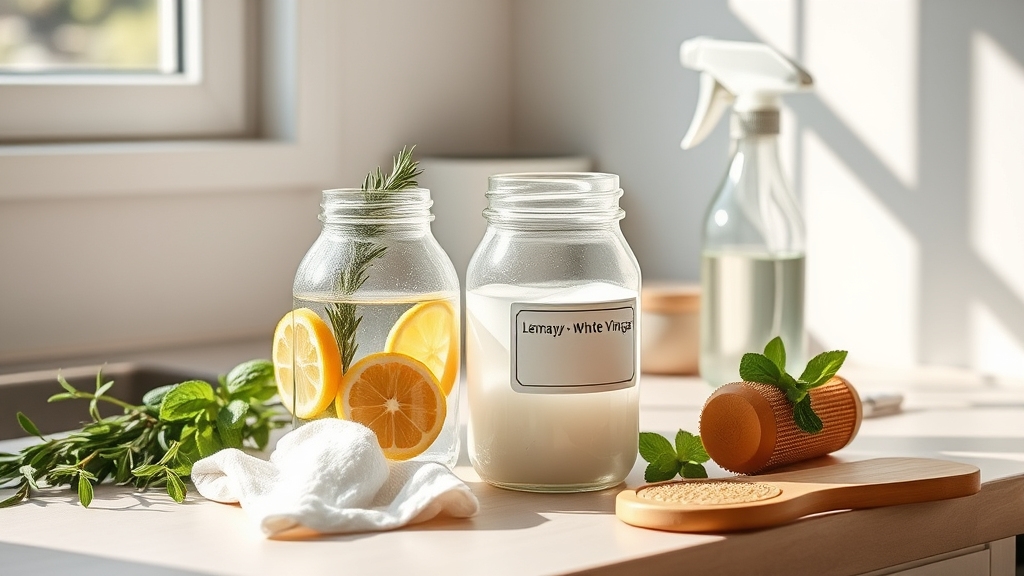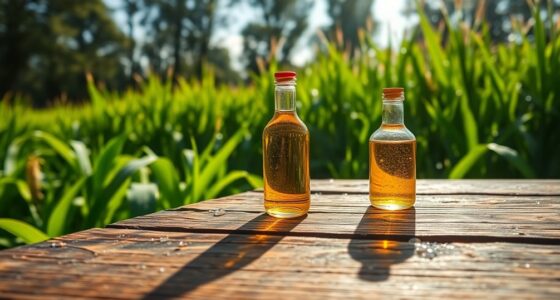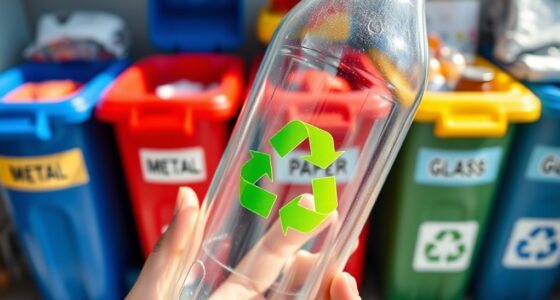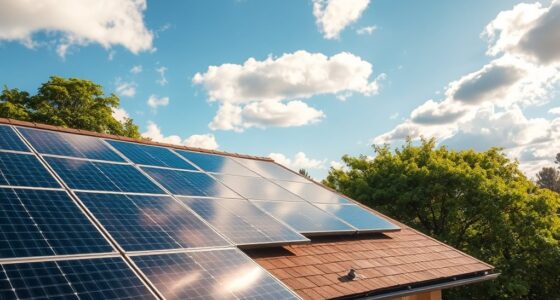You can switch to eco-friendly home cleaning hacks by using natural disinfectants like vinegar, lemon juice, and baking soda, which effectively clean without harsh chemicals. Pair these with reusable tools such as microfiber cloths, cotton rags, and bamboo brushes to cut down waste. This combo keeps your home fresh, safe, and chemical-free while supporting environmental health. Stick around, and you’ll discover simple tips to make your cleaning routine more sustainable and effective.
Key Takeaways
- Use natural disinfectants like vinegar and lemon juice combined with reusable microfiber cloths for effective, chemical-free cleaning.
- Opt for biodegradable cleaning products and tools such as bamboo brushes and cotton rags to reduce environmental impact.
- Create simple routines with minimal natural supplies to maintain cleanliness without relying on harsh chemicals.
- Spray vinegar-water solutions on surfaces and wipe with washable cloths to disinfect safely and sustainably.
- Incorporate preventive maintenance and eco-friendly tools to prolong their lifespan and support a greener home.

Have you ever wondered if you can keep your home spotless while also protecting the environment? The answer is yes, and it’s easier than you might think. Instead of relying on harsh chemicals, you can choose natural disinfectants that are just as effective but far gentler on your health and the planet. Vinegar, for example, is a powerhouse for cutting through grime and disinfecting surfaces. Lemon juice works well too, especially for freshening up kitchens and bathrooms. Baking soda is another versatile natural disinfectant that deodorizes and cleans without any synthetic additives. All of these options are non-toxic, affordable, and readily available, making them perfect for eco-conscious cleaning routines.
Discover natural disinfectants like vinegar, lemon juice, and baking soda for a safe, eco-friendly clean.
Beyond what you use to clean, how you clean matters just as much. Reusable cleaning tools are key to reducing waste and minimizing your environmental impact. Instead of constantly tossing out paper towels or synthetic sponges, opt for washable microfiber cloths, cotton rags, or bamboo scrub brushes. These tools can be used over and over again, cutting down on landfill waste and decreasing your reliance on disposable products. Microfiber cloths, in particular, are highly effective at trapping dust and dirt, meaning you often need only water or natural disinfectants to do a thorough job. Plus, many reusable cleaning tools are designed to last for years, making them a cost-effective choice that benefits the environment.
When you incorporate natural disinfectants with reusable cleaning tools, you’re creating a sustainable cleaning routine that’s both safe and effective. For instance, you can spray vinegar and water onto countertops or bathroom fixtures, then wipe them clean with a microfiber cloth. Not only will your surfaces shine, but you’ll also avoid the fumes and chemical residues that come with conventional cleaners. This approach also encourages you to be more mindful of what you’re using, leading to fewer accidental chemical exposures for your family and pets. Using eco-friendly cleaning methods not only protects your home but also supports the health of the planet. Incorporating biodegradable products into your routine further enhances environmental benefits by ensuring waste decomposes naturally without releasing toxins. Additionally, opting for natural disinfectants like vinegar and lemon juice helps reduce reliance on chemical-laden cleaners, which can have negative health impacts. Furthermore, performing regular preventive maintenance on your cleaning tools can prolong their lifespan and maintain their effectiveness over time.
Another tip is to keep your cleaning supplies simple and versatile. A few natural products, combined with your reusable tools, can handle almost every cleaning task. This minimizes clutter and reduces the number of bottles and packaging you throw away. Plus, it gives you peace of mind knowing you’re not introducing harmful substances into your home environment. By embracing natural disinfectants and reusable cleaning tools, you’re taking a big step toward a healthier, greener home that aligns with your values. It’s all about making smarter choices that protect the planet while keeping your living space clean and inviting.
Frequently Asked Questions
Are DIY Eco-Friendly Cleaning Solutions as Effective as Commercial Products?
You wonder if DIY eco-friendly cleaning solutions match commercial products in chemical efficacy. Generally, they can be just as effective when you use proper ingredient sourcing, like vinegar, baking soda, and lemon juice. These natural ingredients target dirt and grime well, but their success depends on how you prepare and apply them. So, with the right sourcing and technique, DIY solutions can clean effectively without harsh chemicals, making them a smart choice.
How Long Do Homemade Cleaning Solutions Typically Last?
Think of homemade cleaning solutions as good friends—they last as long as you take care of them. Typically, their shelf life ranges from one week to a few months, depending on ingredients. Store them in airtight containers and keep them in a cool, dark place to extend their usefulness. Follow these storage tips, and you’ll enjoy fresh, effective cleaners without worry about spoilage or reduced potency.
Can Eco-Friendly Cleaners Be Used on All Surfaces?
You might wonder if eco-friendly cleaners can be used on all surfaces. While they offer great eco-friendly cleaning versatility, surface compatibility considerations matter. Always check labels for specific instructions, as some natural ingredients may not suit delicate surfaces like marble or hardwood. Test a small area first, and when in doubt, opt for gentle, surface-specific solutions to avoid damage and guarantee effective cleaning across your home.
Are There Any Safety Concerns With Natural Cleaning Ingredients?
Imagine your home as a delicate garden, each ingredient a nourishing drop. Natural cleaning ingredients usually pose fewer risks, but you should still watch out for chemical sensitivities and allergy risks. Some essential oils, for instance, can cause irritation or allergic reactions. Always test a small patch first, and read labels carefully. By staying cautious, you protect your sanctuary while enjoying the gentle, earth-loving power of natural cleaners.
How Can I Store Homemade Cleaning Solutions Safely?
You should store homemade cleaning solutions safely by following proper labeling protocols, clearly marking each container with contents and date. Use durable, non-reactive container materials like glass or high-grade plastic to prevent leaks or reactions. Keep solutions out of reach of children and pets, ideally in a cool, dark place. Regularly check containers for leaks or damage, and always reseal tightly after use to maintain safety and effectiveness.
Conclusion
By choosing eco-friendly cleaning hacks, you protect your home, your family, and the planet. You create a healthier space, reduce harmful chemicals, and embrace sustainable habits. You make a difference with every scrub, wipe, and spray. You foster a cleaner environment, a safer home, and a brighter future. So, keep cleaning consciously, keep caring deeply, and keep making eco-friendly choices—because your actions today shape a better tomorrow for everyone.








